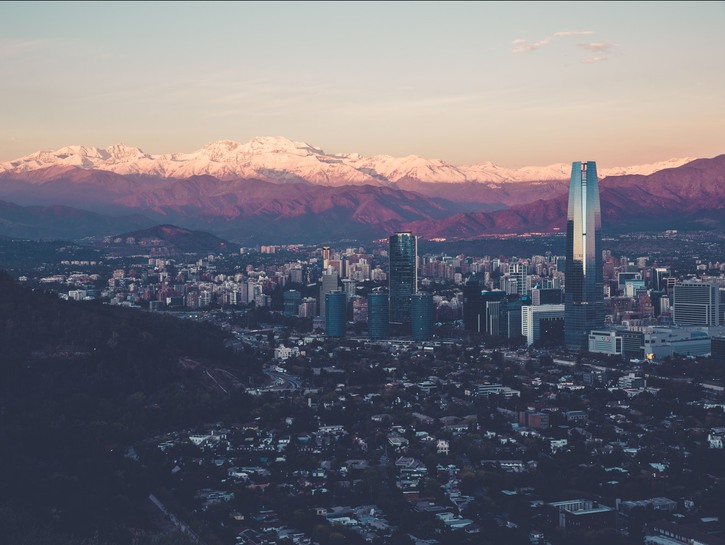
I didn’t go to Santiago, Chile looking for friendship. In fact, before meeting mountaineers from the Chilean company Vertical, Chile was not even on my bucket list.
Videos by TravelAwaits
A mid-life crisis MBA student, I was embarking on my second chance to study abroad. The opportunity presented itself, and I jumped on it. I only wanted to learn from a global business perspective, partake of South American cuisine, and check ‘study abroad’ off my wish list.
Day 5. They organized the group for a neighborhood work project aided by the anti-poverty organization Un Techo. The work was taking place in Campamento San Francisco, a settlement community in the municipality of San Bernardo. Our designated tasks were to build a water tower and paint the community center. They briefed us on the area, its social dynamic, and the necessity of the water tower for the people.
The neighborhood consisted of hundreds of homes with no running water or electricity. The city provided water in giant containers which were upheld by the towers. Someone told us we would see poverty on a vast scale and not to show any physical reactions to it. They encouraged us to connect with the tenants but to not pet or feed any stray animals as they may transmit disease.
Upon arrival, I couldn’t believe my eyes. It was like a scene out of a dreadful film. Several questions fired off in my brain at once. Are these homes? Do people literally live here? How could they? Who is doing anything about this? The homes looked as if they had been formed from stray pieces of construction material, seized by something to hold them up. Residents piled garbage on one border of the neighborhood as if to replace the dump.
I was disturbed by the hardship I witnessed. That moment redefined poverty for me because I had never seen such horrific living conditions.

Campamento San Francisco Santiago, Chile. Photo credit: Desiree Rew.
As advised, I betrayed no hint of the emotional battle going on inside me.
When we showed up, several groups turned out to acknowledge us. Warm smiles from the adults and careful glances from the children. The locals greeted the Un Techo volunteers with big hugs and asked in Spanish: “Who are they and why do they talk funny?” After it was pointed out that we were volunteers from the USA and we were talking in English, we got the green light. The children were friendly and cheery from that moment forward.
Throughout the initial exchanges, my mind was having trouble processing. I was standing in what looked like a genuine disaster, surrounded by people who nevertheless seemed to be content. They wore lively colors. The little girls all had polish on their fingernails and bows in their hair. They weren’t seeking money or selling anything. It was not the response to want I was acquainted with when traveling. I felt ashamed for expecting that it would be.
Just as I was about to start work on painting, a request came through for a few volunteers to help work with one of the resident women. We had picked up some ingredients before reporting, and this woman wanted us to cook it in her home. I raised my hand to help because I felt a yearning to spend time with the people of the neighborhood despite my shortage of Spanish speaking skills.
An Un Techo volunteer brought me along with two others to the home of Nadia. A substantial fence with a lock and thick link chain secured her house. The yard was all earth, with children’s clothes on the line drying and toys askew. There was a sink outside with a bucket underneath, along with a private water tank. Also, there was a nursery of varied potted plants.
The house appeared to have no windows, so the door had to remain open to circulate air. There was a sink, a stove attached to a gas reservoir, a kitchen table adorned with a table cloth and crayons and coloring paper for her daughter. Dishes were kept in a hutch, and the refrigerator marked a visual separation between the kitchen and living room. She furnished the living room with sofas, coffee table, books, family photographs, and art. It was surprisingly pleasant. There were two bedrooms, one for Nadia and her husband, and one for the youngsters.
She answered the door with a modest disposition. She had a sincere smile but not overly friendly. One of the Un Techo volunteers translated between us what our operational strategy would be to cook the meal. Once that was handled, the volunteer left, and we were suddenly on our own to carry out our well-established plan.

Cactus Plant, Santiago Chile. Photo credit: Desiree Rew.
Even without speaking each other’s language, we started to learn about one another. I could figure out concepts, but I could not respond and vice versa. We were becoming sisters without restraints. We chatted about our children, our upbringing, why I didn’t have a sweetheart, her spouse, shared pictures of our family, struggled to instruct each other to communicate the other’s language, and laughed many times.
We cooked spaghetti and heated meat sauce from the jar. We buttered bread and set the table to deliver lunch. We served lunch in 3 different turns to accommodate everyone at a table designed for four. Her mother dropped by and helped. It was a family reunion of sorts, with all the women in the kitchen cooking and talking and laughing. My surroundings became less and less awkward and I went about the house as if I was family. I didn’t have to seek approval to snag the plates or take the jugs of water from inside the refrigerator.
After we fed everybody and the kitchen and dishes were washed, my day was over. But I found myself hesitant to leave. I promised Nadia that I would come back in eight months, in November, with my son to see her and the family again. It was as if I had known her my entire life. I had not predicted the unselfishness of heart I would encounter, and it was moving.
As we were standing by for the van to pick us up from her house, I made the observation that her plants were nice. By their robust growth, it appeared she maintained them. I performed the gesture signaling my custody of a black thumb (point to plant with a finger, finger to heart, head shake no, thumb turned down) and she reached down and offered me a cactus plant. I laughed until it hurt. As we stood in her dirt yard, she gave me a gift when it should have been I giving her one.
I had known Nadia for a few hours, but she made me crave to be a stronger person. She reminded me that a daily dose of gratitude goes along way. She showed me that poverty was external, but happiness was internal. I was seeking to give 100 percent for a well-intentioned cause, but I left receiving 200 percent from her.
I returned that November with my son. He played football (soccer) with the children of the camp, and Nadia proudly introduced us as her friends from the United States. I have visited Nadia four times since our first meeting.
When I visit again, she and her family will be in their new home, and I suspect we will be in the kitchen with running water together laughing and making hand gestures to talk because I have still yet to learn a sufficient amount of Spanish to carry on a full conversation and she has not learned a stitch of English.

L-R: David Hamm, Jr., Desiree Rew, Nadia Diaz, Tomas Diaz, Nazareth Diaz. Santiago, Chile. Photo credit: Desiree Rew.
